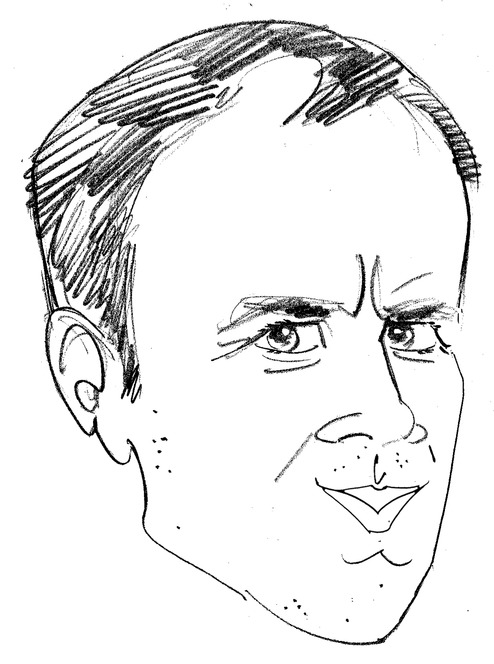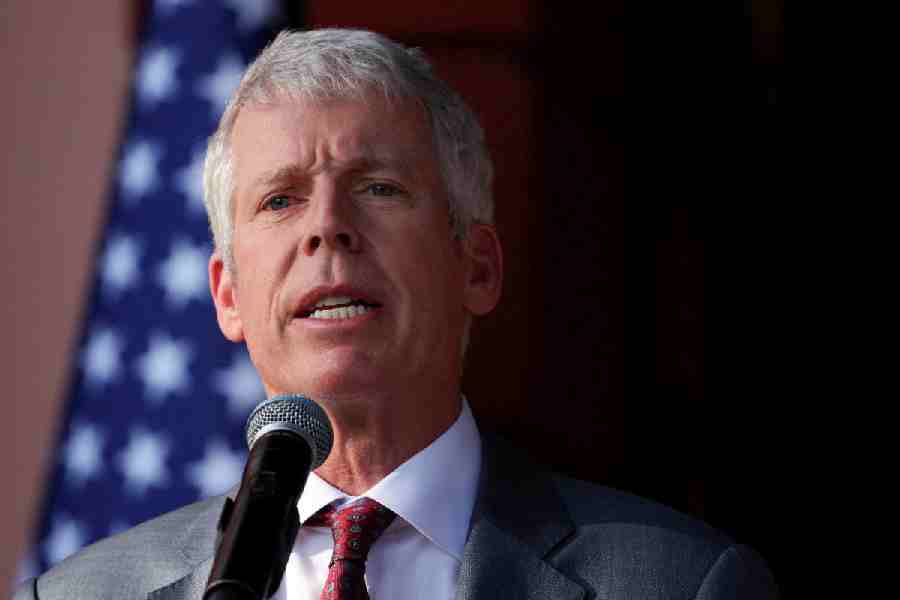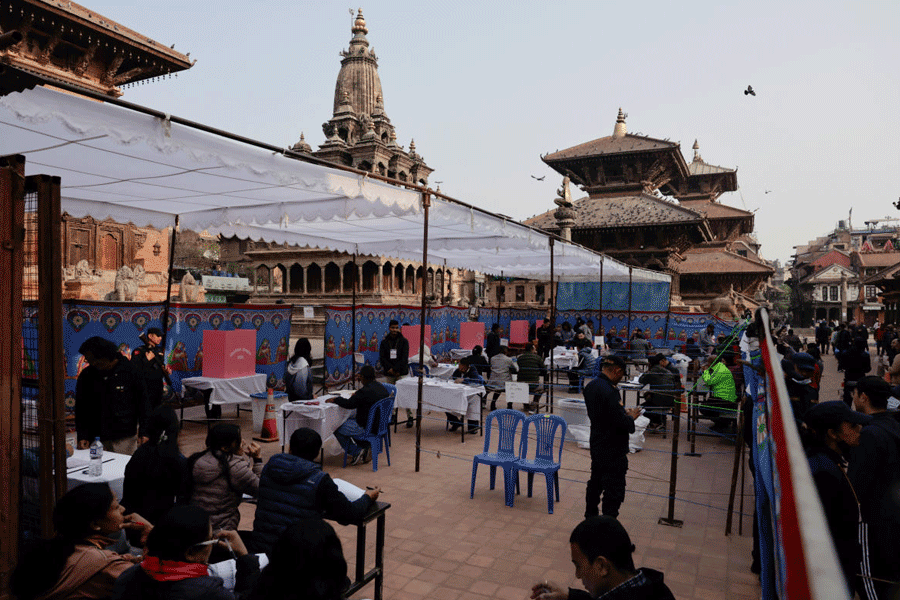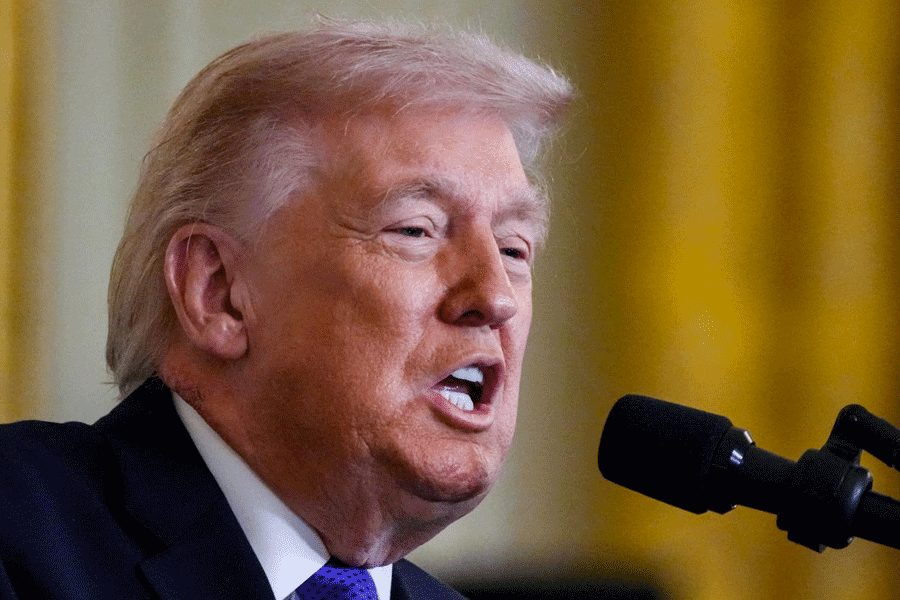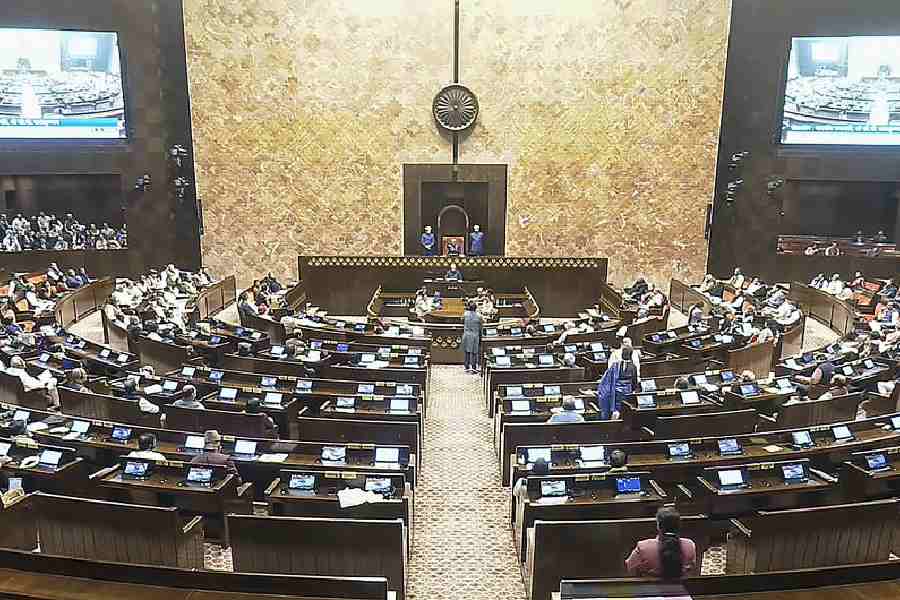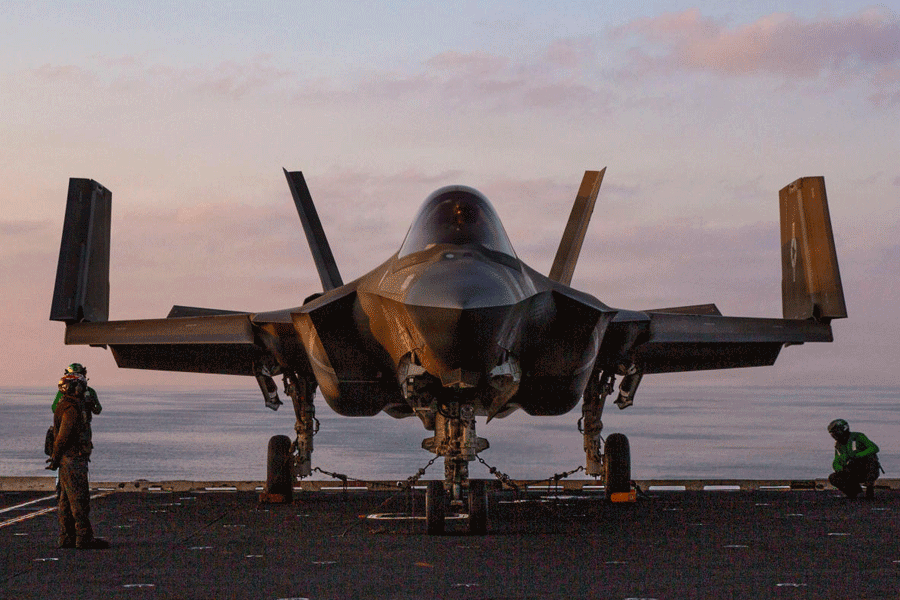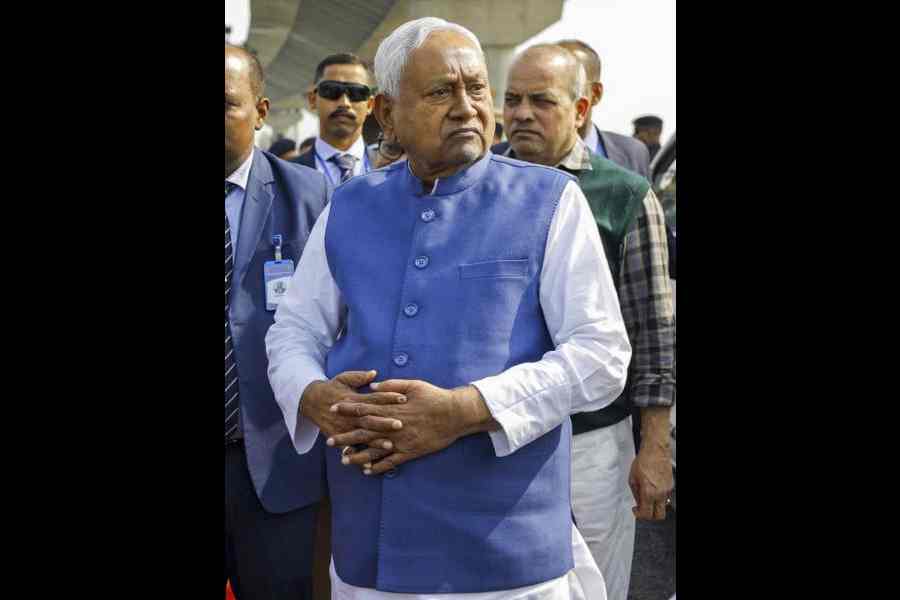
Kashmir has become a front-page carbuncle, spewing dire symptoms. One day, the image of a young man trussed up beast-like to the front grille of an army vehicle as shield from hostile crowds; another, the unbecoming spectre of a young student in uniform, school-satchel strapped to his shoulders, hurling back a tear gas canister already oozing fumes; yet another, college girls fleeing a scene of mayhem mid-Srinagar - plumes of smoke, a crazy litter of pelted stones, jawans in chase, brandishing riot gear. It's tough to tell what has brought the flush to Omar Abdullah's cheeks - the phosphorescent fires blazing back home, or is it merely the unremitting Delhi heat? He's turned out in airy cotton pastels, his swarthy frame striding Birkenstock casuals - a drastic change of kit from Srinagar.
It can't be the suddenly-risen Met mercury, though; we are in the tastefully appointed basement of his camp residence, it's square-scale, high-ceilinged and aqua-cool. There's a retro street map on one wall that I mistake for Srinagar's at first distant glance; it's a layout of central London so detailed it marks out bakeries and laundrettes. The adjacent wall isn't a wall but a gleaming façade - a light emitting diode (LED) screen that, would you believe it, is only a television set; it's billboard size, the kind you see looming over flyways. You wouldn't want to see a horror movie on it; nor scenes from contemporary Kashmir. It is probably fitting Omar appears content with the screen-size on his hand-held. It has been insistently pinging; bad news seldom waits to intervene.
Omar's brow is frequently furrowed; he cocks the scholar frames on the bridge of his nose, gives the arriving missive a quick read, then gets back to a conversation he'd rather not be having. "I don't want to sound wholly pessimistic or dark, but it is that. Kashmir has entered its darkest phase in several decades, and frankly nobody seems bothered doing anything meaningful. You have a chief minister who can't hold a parliamentary election on her watch, and Prime Minister who thinks Kashmir can be run by smart sound bites. Sometime ago he proclaimed Kashmiris had chosen ballot over the bullet, now he is asking them to choose tourism over terrorism. Part of the tragedy and the misfortune is we are treating an extremely complex, and increasingly alarming, situation with simplistic phrase-mongering."
But his father and National Conference (NC) president, Farooq Abdullah, has just won his seat and returned to the Lok Sabha from Srinagar, isn't that cause for consolation? Omar dons his glasses again and mulls head down, as if he is trying to decipher some invisible script on how to play this. His cheeks flush up anew. "Well, frankly speaking, not at all. This isn't a victory we have reason to celebrate. It gives us no pleasure at all, I have never felt as horrible as I did on counting day. What election was this? Seven per cent people voted, eight died, how can there be any consolation in it?" The senior Abdullah took Srinagar by 10,000-odd votes of a total of merely 80,000 or so polled. To Omar, the import of that victory is portentous. "The mainstream space in the Valley has vanished, that is what this result tells us. The Anantnag election had to be scrapped because Mehbooba and her brother ran scared, even though this is their own government. The Srinagar election saw a 7 per cent vote, of which my father got half. So what does he represent? Three-and-a-half per cent? That is what we have got reduced to, and it is deeply worrisome if we go on like this. Mehbooba is clearly not the person for the job, that is why we have formally demanded central rule, there's no way out of this insanity at the moment."
As tough and thankless as holding the reins of Kashmir is, Omar can lay credible claim to saying "been there, done that"; at 44 in 2014, he was done with his first term as chief minister and dusted in the elections. His time at the helm wasn't easy; the summer of 2010 saw one of the worst bouts of street violence, a spell in which today's bands of stone pelters may well have apprenticed. His government stood momentarily paralysed, unable to divine ways out of the spiralling violence. Not unusually, Delhi went rife with speculation Omar would have to quit, or would on his own. But he stayed the course, aided, in part, by the then Union home minister, P. Chidambaram, with whom Omar had struck a good working vibe.
"We went through a very rough and trying patch," Omar concedes, "But we learnt some lessons. We reached out, we were able to persuade New Delhi to form a group of interlocutors who spent a lot of time talking to all Valley sections without any pre-conditions. Of course, nobody can presume they had authority to talk beyond the Constitution but they did not ram that pre-condition down the throats of people they approached. There was a sense of soothing, which is why after the violent summer of 2010, we had one of our most peaceful summers in 2011. I don't see any effort by anybody to reach out today, last year's violence and wounds (following the killing of young Hizbul Mujahidin militant Burhan Wani) have yet to be resolved, there is unassuaged anger, Kashmir is drifting into a dangerous place."
What's new, though, what has changed? Is it because Mehbooba Mufti's alliance with the BJP is unpopular? Is the BJP cramping her for room? "It is that, but not entirely that," Omar reasons, "Such an alliance was always going to be unpopular in the Valley, but people gave her time. It is only when they saw she is not willing to respond to any of their problems or sentiments and that she is merely interested in hanging on to her seat come what may, that tempers have burst. Kashmir cannot be run by tweets; it requires, for a start, empathy and understanding."
It's now that Omar comes careening back to the slideshow this Kashmiri spring has been, the front-page carbuncles. "An innocent young man is tied to the front of an army jeep and driven village after village as human protection and inhuman warning. There is public outcry but nothing happens. The chief minister says its unacceptable and demands action and nothing happens. Instead, the Attorney-General of India sets out to justify what is a horrible human rights atrocity. A sentence of innocence is blithely passed without so much as an enquiry. Where does that leave people like us, the bearers of Indian democracy in Kashmir? What am I to go back and tell my people, that this is the kind of justice you will get? What law are the people of Kashmir to believe in? We hold the army and security forces to certain standards, we don't hold stone pelters to standards. But is this the new standard set by security forces in Kashmir, that you torture and pillage with impunity and you will be protected? We have no space to operate, nobody will listen..."
That burst is barely done when a successor burst takes over. "And now you have these new images of students taking to the streets and battling security forces. Can anyone even imagine the implications of this? What's to happen if students across Kashmir start doing this? They are angry, their grouses are only being met by strong-arm tactics on the street, that is no place to deal with it. At least persuade them home, promise them a hearing, then listen. But I am convinced Mehbooba is not up to the job."
And New Delhi? "I have knocked doors in New Delhi, I have come knocking several times. I have told them there is a deep problem and we are there to help you with anything. Frankly, I have no miracle solutions, there aren't any. But we have our ears to the ground, the NC is still a party with workers in each village, we have a good sense of what's happening. But who's prepared to listen?"
Omar has read the interview Ram Madhav, BJP general secretary and pointsman for the PDP-BJP alliance, recently gave to The Telegraph, and picks it out as a symptom of the pervading problem. "How long can people here be in such denial about the anger on the ground in Kashmir? How much credit do you want to give to Pakistan for the mess you've created in Kashmir? Pakistan is fishing in troubled waters, yes, and absolutely, but these waters are of our making and we have to urgently do something about it. Pakistan is a happy passenger on this turbulent ride. The fact is that there is today a huge gulf between the Establishment or the government and the people of Kashmir. The chasm is so huge, there is no place for people like us to put a foot, it is absolutely frightening."
Could he be suggesting Kashmir is lost? A sardonic smile floats across Omar's lips; he takes his glasses off and bores into his lenses from a length. "But where is Kashmir going to go? It's a piece of land and it can't go anywhere. That territory will not drift away anywhere, of course not. But the question is do you want Kashmiri territory alone, or do you want its people too. That's where the key lies; Kashmir is not just a piece of land, it is full of Kashmiris and they are, for good reason, very, very angry." So is Omar Abdullah, even in the coolth of his removed Delhi basement.
tetevitae
1992: After being schooled partly in Rochford (UK), partly in Srinagar, and finally, Lawrence School, Sanawar, the 1970-born Omar Abdullah graduates from Sydenham College, Mumbai
Begins his professional life, first as a marketing executive with a leading hotel chain. Then moves to Calcutta to work for an Indian conglomerate
Quits in 1998 to join politics. A year later, becomes the Union minister of state for commerce and later, for external affairs in the Vajpayee-led NDA government
2002: Quits NDA and moves back to Kashmir. In the Assembly polls he loses - from Ganderbal - but takes on the mantle of the National Conference from father Farooq Abdullah
2006: Meets Pakistan President Pervez Musharraf in Islamabad much to the displeasure of the Centre
2008: Wins the Assembly elections. Though father Farooq had been projected as chief minister, Omar becomes the 11th and the youngest CM of J&K; forms government in coalition with Congress
2014: Loses the Assembly polls. The active social media person that he is, he tweets: "You know you are a social media junkie when reality doesn't hit home till you read it on your updated @twitter bio"
Currently, leader of Opposition in the J&K legislative Assembly

